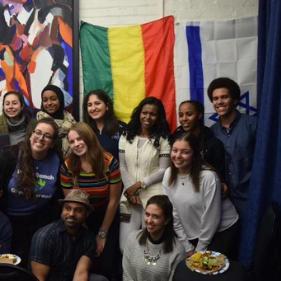Students form Black Jewish Cohort to Connect and Celebrate

“I’ve lived my whole life as a Black-Jewish woman, and I wouldn’t trade it for the world. But it was hard growing up and feeling as if I was somehow on the outside of my own community,” said Tova Ricardo, a senior at Columbia University. “This feeling has followed me my entire life. Whenever I go into a Jewish space, I’m constantly thinking, ‘Do people see me as a Jew?’”
Ricardo is co-president of the Columbia Jews of Color Caucus at Columbia/Barnard Hillel. Much of her work involves educating the Jewish community about the experience of Jews of Color.
“Being a Black-Jewish person isn’t just showing other people the foods that we eat and how we pray—it actually comes down to, ‘Please see that we exist,’” she said. “It’s important to teach other people about who we are, but it’s also important that we have our own spaces.”
This is the point of the Black-Jewish Cohort, which was created in February to provide a community for students across the Hillel movement who identify as both Black and Jewish. The Cohort is a collaboration between Ricardo, Léa Jean-François—a senior at Barnard College and the other co-president of the Columbia Jews of Color Caucus—and Noah Shufutinsky, who graduated from George Washington University in December. The three students were tapped by Hillel professionals to lead the Cohort’s planning committee.
As part of Hillel International’s virtual Hillel@Home platform, the Cohort hosts monthly social and educational programs—from conversations for just Black Jews to talks for everyone by Black-Jewish professionals from various fields. The Cohort also received key support from the Jews of Color Initiative, “a national effort focused on building and advancing the professional, organizational and communal field for Jews of Color.”
According to Shufutinsky, the diversity of speakers highlights the diversity within the Black-Jewish community.
“Representation is really important,” he said. “People who are doing amazing things in different areas of the world have the opportunity to share their experiences with younger members of their community.”
The Cohort’s event last month with Michael Twitty, a Black-Jewish culinary historian, resonated with Jean-François because she likes to blend Ashkenazi and Caribbean cuisines in her cooking. Similarly, she uses the Jewish holidays to combine different histories. On Passover, for example, she compares the liberation of the Jews to the Haitian Revolution.
For Jean-François, the Cohort is somewhere she can “be everything through a Zoom screen.” She stressed that the Cohort isn’t primarily about the “trials and tribulations” of being a Jew of Color—the ignorance and microaggressions she often encounters in Jewish and other predominantly white spaces.
“We wanted a space where it wasn’t about challenges in a world where there are so many of them,” she said. “We just wanted a space to exist.”
Ricardo emphasized the importance of having a place where she doesn’t have to educate Ashkenazi Jews about her identity, which can be exhausting.
She noted that “the Black-Jewish experience is not monolithic,” a sentiment Jean-François echoed.
“The experiences are so similar across these different universities in terms of being involved with Hillel and going to college as a Jew of Color in general, but also vastly different, and I think that’s what’s beautiful about it,” Jean-François said. “What is similar is the capacity to enter and be accepted as whole, and that goes a long way.”
When life gets tough, Jean-François finds comfort in connecting with fellow Jews of Color. Shufutisky said that the Cohort allows for this.
“I’m glad to be part of the Black-Jewish Cohort because I get to celebrate aspects of my identity and the successes of my own Jewish community,” he said. “And on the other side of that, there are people who can share their struggles with a group of people that can give them the feedback, support, and resources they need to navigate their own identity and their own journey.”
Although the pandemic has been isolating, Shufutinsky said that it has also provided an opportunity to connect with fellow Black Jews he never would have met otherwise.
“In college, I had a pretty large community of Black Jews through the different organizations I was part of, but at the same time, I know that there are plenty of people who don’t have that—maybe they don’t know any other Black Jews,” he said. “So, it’s created a really cool opportunity for us to get to know each other, even if we’re geographically far apart.”
Michael Kagan, Hillel International’s senior associate of global student leadership, helps facilitate the cohort, and intends to expand it in the future.
“Everything we’re doing this year is really groundbreaking for the Hillel movement,” he said. “Our hope is that this becomes a consistent initiative that we build on annually. Hopefully post-COVID this is more of an in-person experience as well.”
Ricardo expressed her gratitude for Hillel’s strides to support Black Jews as the nation reckons with racial injustice and Jewish institutions reckon with their “Ashkenormativity”—the tendency to center Jews of Eastern European heritage.
“To have a national effort that is specifically for Black-Jewish people is really comforting,” Ricardo said, “and I’m really glad to be a part of it.”